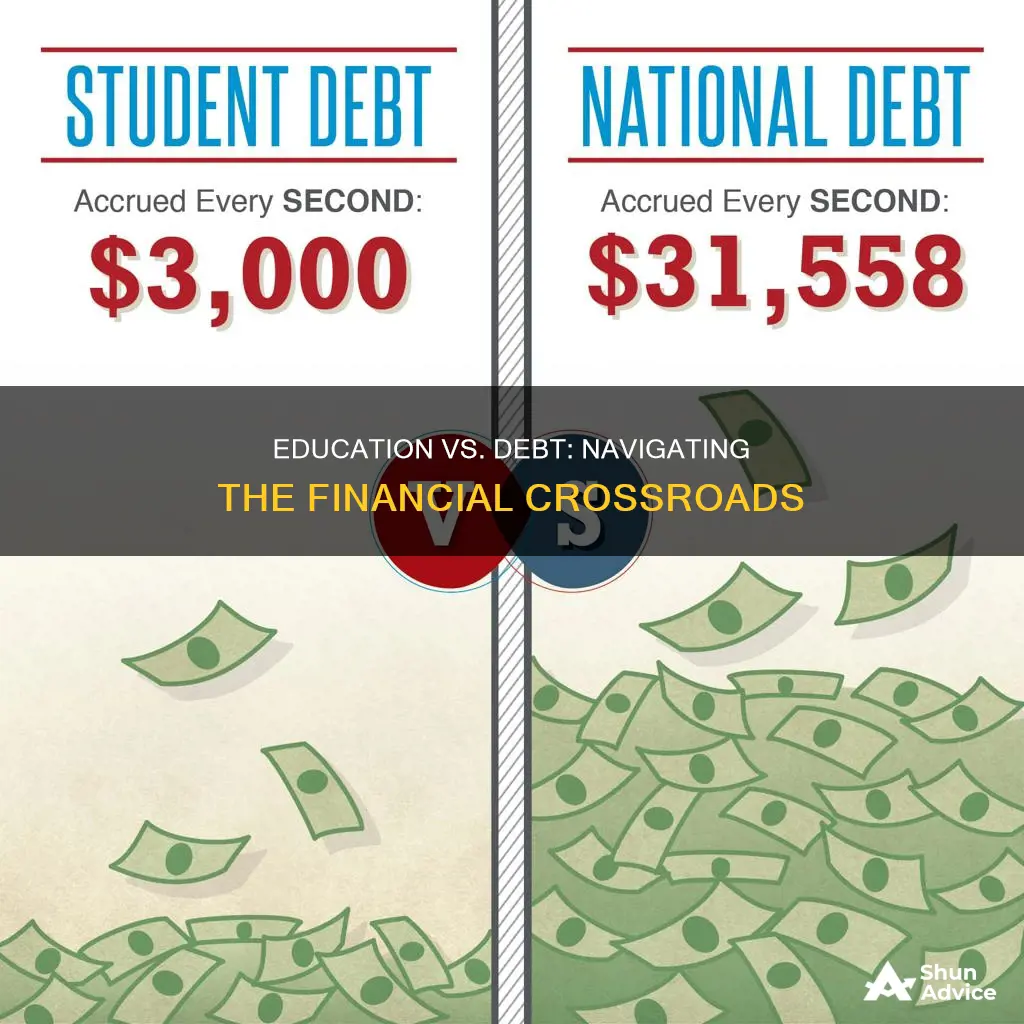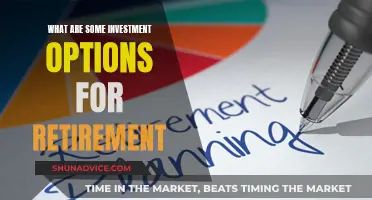
Whether to invest in education or pay off debt is a common dilemma. Both are worthy goals, and the best choice depends on individual circumstances.
Paying off debt reduces interest expenses, but investing can be more lucrative if you can earn a higher interest rate on your investments than you are paying on your debts.
High-interest credit card debt is costly over time and challenging to get ahead of, so it is generally advisable to prioritise paying this off first. In contrast, student loans and mortgages tend to have lower interest rates, so they are less of a priority when deciding how to allocate your money.
It is also important to consider your risk tolerance. Investments can be volatile, and you may lose money, whereas paying off debt is a safer option.
Additionally, you should ensure you have an emergency fund to cover unexpected expenses and take advantage of any employer retirement plan matches before deciding how to allocate your money.
In summary, both investing in education and paying off debt are important financial goals, and it is often possible to work towards both simultaneously.
| Characteristics | Values |
|---|---|
| Interest rates | Compare the interest rates of your debt to the expected return on your investments. If the interest rate on your debt is higher, it may be better to pay off the debt first. |
| Risk tolerance | Consider your risk tolerance. Investing carries more risk than paying off debt, so if you are risk-averse, you may prefer to pay off debt first. |
| Credit score | Paying off debt can improve your credit score, which can lead to lower interest rates on future loans. |
| Emergency fund | It is generally recommended to have an emergency fund before investing or paying off debt. This will help cover unexpected expenses and prevent you from taking on more debt. |
| Retirement savings | Contribute to your retirement savings, especially if your employer offers a match. This can provide tax benefits and help you save for the future. |
| High-interest debt | Focus on paying off high-interest debt, such as credit card debt, first. |
| Student loans | If you have federal student loans with low-interest rates and potential loan forgiveness, investing may be a better option. |
| Peace of mind | Consider your feelings and personal goals. Paying off debt can provide peace of mind and relieve stress. |
What You'll Learn

Weigh up the interest rates
When deciding whether to invest in education or pay off debt, it's important to weigh up the interest rates of your debt against the potential returns of your investments. Here are some key considerations:
Compare Interest Rates and Expected Returns
The general rule of thumb is to compare the interest rate on your debt with the expected return on your investments. If your debt has a higher interest rate, it is often wiser to prioritise paying it off before investing. Conversely, if your expected investment returns exceed your debt interest rate, investing may be more advantageous. However, forecasting precise return rates can be challenging, even for experts.
Consider the Nature of Your Debt
Not all debts are created equal. Credit card debt, for instance, typically carries much higher interest rates than other types of debt, such as federal student loans or mortgages. As of April 2024, the average interest rate on credit cards was 24.37%, according to Investopedia's credit card database. In contrast, federal student loans tend to have lower interest rates and offer more flexible repayment options and benefits. Private student loans, on the other hand, are riskier and often carry higher interest rates.
Assess the Impact on Your Credit Score
Paying off debt, especially credit card debt, can positively impact your credit score. A higher credit score can improve your chances of securing future loans, such as mortgages or car loans, and may even lead to lower interest rates on those loans. Additionally, a good credit score can positively influence other aspects of your life, such as insurance premiums, rental applications, and employment opportunities.
Evaluate Your Risk Tolerance
Investing in the stock market or similar vehicles can be volatile, with potential ups and downs. If you are comfortable with the inherent risk and market fluctuations, investing may be a good option. However, if the idea of market volatility keeps you awake at night, you may be better off prioritising debt repayment to improve your peace of mind.
Consider a Hybrid Approach
Paying off debt and investing don't have to be mutually exclusive. You can allocate a portion of your funds to both goals. For example, you could start by building an emergency fund, which can provide financial security, and simultaneously work on paying off your high-interest debt.
Songs: The New Investment Avenue
You may want to see also

Assess your risk tolerance
When deciding whether to invest in education or pay off debt, assessing your risk tolerance is a crucial step. Here are some detailed guidelines to help you evaluate your risk tolerance:
Investment Goals
The first step is to understand why you are investing. Common goals include saving for your child's education, achieving financial independence, or investing for retirement. Determining your investment goals will help you assess your risk tolerance and the timeframe within which you want to achieve these goals.
Time Horizon
Your investment goals are closely tied to your time horizon, which is the period over which you plan to invest to achieve your goals. Generally, a longer time horizon, such as saving for retirement, allows you to take on more risk, as your investments have more time to recover from potential downturns. Conversely, a shorter time horizon, like saving for a house down payment, may require a more conservative approach, as you have less time to recoup any losses.
Comfort with Short-Term Loss
Consider how comfortable you are with potential short-term losses. Investments can fluctuate, and you may need to sell at a loss if you need the money quickly. If you have a longer time horizon, you can hold on to your investments, giving them time to recover and potentially increase in value. Risk-averse investors often opt for a diverse portfolio of stocks, bonds, and real assets to minimize the impact of short-term losses on their overall portfolio.
Non-Invested Savings
Having some savings set aside in liquid accounts is important, regardless of your risk tolerance. This emergency fund ensures that you have easily accessible cash in case of unexpected expenses, such as job loss or accidents. If you are nervous about investing and prefer to keep a large portion of your savings in cash, this indicates a more risk-averse attitude.
Tracking Frequency
Another factor to consider is how frequently you plan to track your investments. Will you be monitoring them daily, weekly, or only occasionally? If the idea of market fluctuations makes you anxious, a diversified portfolio focused on long-term goals can help mitigate these concerns. On the other hand, if market movements excite you and prompt you to seek new investing opportunities, you may be more inclined to take on additional risk.
Risk and Reward
Remember that all investments involve some level of risk, and this risk is typically correlated with the potential for higher returns. Aggressive investors, or those with a high-risk tolerance, are willing to accept the possibility of losing money in pursuit of better results. In contrast, conservative investors, or those with low-risk tolerance, prioritize maintaining their original investment over potential gains.
By carefully considering these factors, you can assess your risk tolerance and make a more informed decision about investing in education or paying off debt.
Ford: A Smart Investment Move
You may want to see also

Consider your credit score
When deciding whether to invest in education or pay off debt, it is important to consider the impact of your decision on your credit score. Your credit score is a significant factor in your financial life, influencing your ability to borrow money, the interest rates you pay, and even non-financial aspects such as renting an apartment or getting hired for a job.
The amount of debt you owe is a crucial factor in determining your credit score. While having a lot of debt does not necessarily hurt your credit score, your ability to repay it does. Lenders want to see that you are not overextended and can manage your debt effectively. Keeping your credit card balances low is essential, as a high balance can indicate that you are relying too heavily on credit and may have trouble making payments.
Your credit utilisation ratio, which is the amount of credit you are currently using compared to your total available credit, is a significant factor in your credit score. Maxing out your credit cards can negatively impact your score, as it suggests you are unable to manage your debt. It is recommended to keep your credit utilisation level below 30% to maintain a good credit score.
Paying off debt, especially high-interest debt, can be a smart move to improve your credit score. When you pay off debt, you eliminate interest expenses, and once the debt is paid off, you can start earning interest income on the money you would have spent on debt payments. Additionally, paying off debt can free up cash flow, enabling you to build an emergency fund or invest for the future.
However, it is important to consider the opportunity cost of paying off debt versus investing. Investing can provide higher returns than the interest you are paying on your debt. If you can earn a higher return on your investments than the interest rate on your debt, investing may be a better option. Nevertheless, investing carries more risk and volatility, and you should consider your risk tolerance and financial goals when making a decision.
In conclusion, when deciding between investing in education and paying off debt, carefully consider the impact on your credit score. Paying off debt, especially high-interest credit card debt, can improve your credit score and reduce financial stress. However, investing can provide higher returns and help you build wealth over time. The best decision depends on your individual circumstances, risk tolerance, and financial goals.
Investor Intentions: They Want to
You may want to see also

Plan for emergencies
When deciding whether to invest in education or pay off debt, it is important to plan for emergencies. Here are some things to consider:
Start with a budget
Juggling basic expenses like rent, utilities, transportation, and groceries can be challenging. If you can manage these expenses comfortably and have money left over, congratulations! You can start thinking about how to allocate your extra cash. Budgeting is essential, and it is important to track your income and expenses. This will help you make informed decisions about paying off debt or investing in education.
Save for emergencies
Before allocating your extra cash towards debt repayment or investing, it is recommended to have at least a small emergency fund. This fund will help cover unexpected expenses, such as car repairs, medical bills, or job loss. Aim to save at least three to six months' worth of expenses. This will reduce the likelihood of needing to increase your debt in the event of an emergency.
Prioritize high-interest debt
If you have high-interest debt, such as credit card debt, consider making it a priority to pay it off. By tackling high-interest debt first, you can save money on interest and free up cash flow to build your emergency fund or invest in education.
Understand the opportunity cost
When deciding whether to pay off debt or invest, consider the opportunity cost. Paying off debt eliminates interest expenses, while investing can potentially earn you interest income. Compare the interest rates on your debt with the potential returns on your investments to make an informed decision.
Maintain a balanced approach
Remember that paying off debt and investing in education are not mutually exclusive. You can do both simultaneously. For example, you can start by building an emergency fund while also making regular payments towards your debt. Once your emergency fund reaches a comfortable level, you can allocate more of your extra cash towards debt repayment or investing in education.
Seek professional advice
If you are unsure about how to prioritize your finances, consider seeking advice from a financial planner or advisor. They can help you assess your situation, understand the pros and cons of different options, and make a plan that aligns with your goals and risk tolerance.
C-Corp: Why Investors Choose This Structure
You may want to see also

Consult a financial advisor
Deciding whether to invest in education or pay off debt can be a difficult decision. Consulting a financial advisor can help you make an informed choice that aligns with your financial goals. Here are some reasons why seeking professional advice can be beneficial:
- Expertise and Objectivity: Financial advisors are experts in their field, offering valuable insights and knowledge about investment strategies and debt management. They can provide an objective perspective on your financial situation, helping you understand the pros and cons of each option.
- Comprehensive Analysis: Advisors will conduct a comprehensive analysis of your financial health, including assessing your income, expenses, debt obligations, and investment opportunities. They will consider factors such as interest rates, tax implications, and your risk tolerance to develop a tailored plan that maximizes your financial well-being.
- Goal Setting and Planning: Financial advisors will work with you to define clear financial goals and create a step-by-step plan to achieve them. They can help you prioritize your financial objectives, ensuring that your decisions are aligned with your short-term and long-term targets.
- Risk Management: Investing in the stock market or other financial instruments carries inherent risks. Financial advisors can help you understand and manage these risks effectively. They will assess your risk tolerance and make suitable recommendations to balance potential returns with the level of risk you are comfortable taking.
- Behavioral Guidance: Paying off debt or investing for the long term often requires discipline and a shift in spending habits. Financial advisors can provide guidance and support to help you stay on track with your financial plan. They can offer strategies to manage impulses and provide accountability to keep you motivated.
- Regular Review and Adjustments: Financial advisors don't just create a plan and walk away. They provide ongoing support and regularly review your progress to ensure you stay on course. If adjustments are needed along the way, they can help you make informed decisions and tweak your strategy accordingly.
Remember, everyone's financial situation is unique, and there is no one-size-fits-all solution. A financial advisor will take the time to understand your specific circumstances and provide personalized advice. They can help you navigate the complexities of investing and debt management, ensuring that you make well-informed decisions with your money.
Analyzing Investment Opportunities: Strategies for Success
You may want to see also
Frequently asked questions
Investing for the long term has increased growth potential. If you can earn more on your investments than your debts are costing you in interest, investing may be the better option.
Paying off high-interest debt will likely provide a better return on your money than almost any investment. It will also improve your credit score, which can be very important if you want to borrow money in the future.
Yes, it is possible and often advisable to do both. Contributing to three buckets — debt payoff, retirement, and an emergency fund — is a good rule of thumb.
Focus on paying off high-interest debt first, such as credit card debt.







